The HawkAs I said previously, I’ve been wanting to make a post about Connie Hawkins, someone I had on the fringes of my top 25 peaks going into this thing, and was persuaded to back him about about 10 places. I’m glad he’s gaining a tiny amount of traction (and again: I’m surprised someone else beat me to it) at any rate, so let’s take a closer look at him.
Physically, he’s listed as 6’8” (and from all photographic evidence I’ve seen, I think he’s a legit 6’8”.....not like a “generously 6’8” in his shoes” type of situation), and 210 lbs on bbref. He’s got a wirey strong build, a pretty long reach, and massive hands (which enable all the one-handed palm pass fakes, crazy sweeping scoop shots, etc):
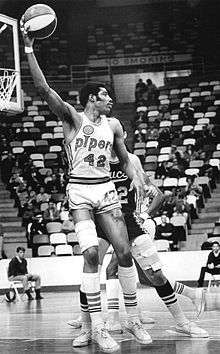
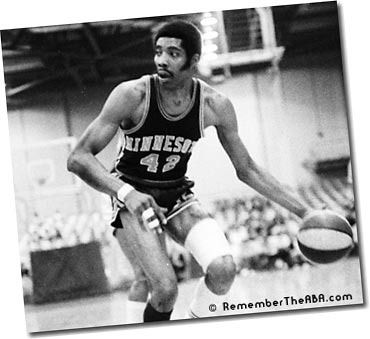
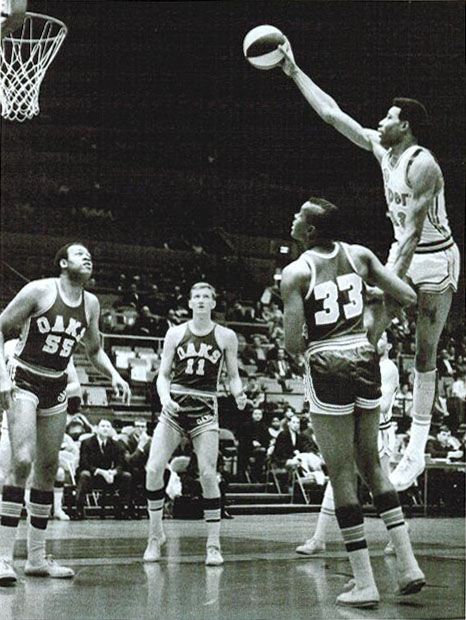
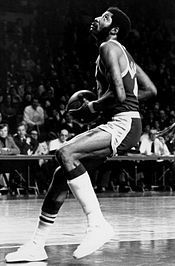
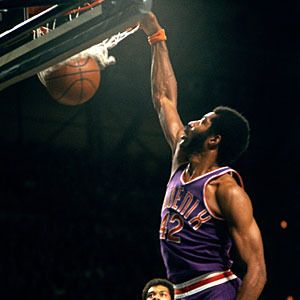
And he’s got some grace, speed, and ups, as you can get a little sense of from in the videos below, as well as seeing some of the one-handed palming plays (and bear in mind when watching that almost all of that footage is him PAST his physical prime). Overall physically, he’s kinda reminiscent of Scottie Pippen, but with bigger hands.
He’s got some solid mid-range touch (again, see in videos below), and some good handles and passing for a biggish guy (was the original “point forward”, if I’m not mistaken).
[youtube]https://www.youtube.com/watch?v=JVPmeFq0Isk[/youtube]
[youtube]https://www.youtube.com/watch?v=xxp_N46XPUk[/youtube]
Now before we get into what he did in his peak season (‘68), let’s first take a quick look at what he was still capable of in his late 20’s AFTER knee surgery (which I’m sure you’re all aware of how well players were typically able to come back after knee surgery in that day and age).
Coming into the NBA as a 28-year-old rookie, one year after knee surgery, he went for a 10th-in-the-league 19.74 PER and .147 WS/48 in 40.9 mpg. His per 100 poss estimates: 24.8 pts, 10.5 reb, 4.85 ast @ +5.16% rTS. And fwiw, he was awarded All-NBA 1st Team honors alongside Billy Cunningham, and ahead of forwards Lou Hudson and Gus Johnson. Did nearly as well (on larger minutes) in the playoffs that year: somewhat inflated by pace, but he avg 25.4 ppg/13.9 rpg/5.9 apg in the ‘70 playoffs.
Again: this is what he was capable of past his physical prime. Statistically, he’s not far behind [an arguably peak] Walt Frazier, who we voted in at #32.
Anyway, I wanted to throw a little spotlight on what he was capable of in the NBA post-surgery because I want everyone cognizant of the very real possibility (if not the
likelihood) that he was even better before his knee injury.
If you don’t think the knee injury affected him, consider his scoring averages (it’s all that’s available on game log data of the time) in ‘69 before the injury: he was averaging 33.4 ppg pre-injury. In the 11 rs games AFTER coming back from injury: 19.9 ppg, followed by a significantly sub-standard (poor, actually) playoffs. I realize I cannot precisely extrapolate what he was in ‘70 by citing his late-season (post-injury) stats from ‘69; but anyway take it for what it’s worth.
In the ‘69 ABA season (marginally stronger than the ‘68 ABA, imo) there was also a presumably near-peak Rick Barry around for 35 games to compare to…..
‘69 Barry per 100 poss estimates: 36.0 pts, 9.95 reb, 4.1 ast @ +11.35% rTS
PER 29.6, .301 WS/48 in 38.9 mpg
**‘69 Hawkins per 100 poss estimates: 33.6 pts, 12.6 reb, 4.35 ast @ +8.25% rTS.
PER 29.7, .293 WS/48 in 39.4 mpg.
**
this includes the aforementioned 11 games (11 of 47 total) AFTER coming back from the injury, btw. Given the scoring drop I already outlined, it’s safe to assume his pre-injury numbers were
significantly better than what a near-peak Barry was doing. Frankly, he was probably a better player (before the injury) in '69 than he was in '68.
Now on to his ‘68 peak season (perhaps only peak by default, because he was actually healthy from start to finish)…...
Yes, the ABA of the late 60’s was not overly loaded with talent, as Clyde Frazier pointed out. It wasn’t total bush-league, either. Mel Daniels was there, and there were several other legitimately “good” (if not truly “All-Star level”) players around: Donnie Freeman, Louie Dampier, Larry Jones, Roger Brown, Doug Moe, John Beasley, etc.
And at any rate, Hawkins didn’t just distinguish himself in this crowd…….
he utterly crushed them. He led the league
handily in PER and WS/48, for instance, despite playing a league-leading 44.9 mpg. He had nearly twice as many OWS as the 2nd-place guy. He dominated that league to a degree that we haven’t often seen.
Seriously: do a search for seasons with >28 PER (his was 28.8), >.270 WS/48 (his was .273), and >40 mpg (his was a whopping 44.9) in NBA and ABA history…...you come up with just 10 NBA seasons (3 of Kareem, 3 of Wilt, 2 of Jordan, 1 of Robinson, 1 of Shaq), and only 1 in ABA history (Connie Hawkins). If we change the requirement to 42 mpg, five of those NBA seasons disappear, btw.
Per 100 possession estimates for ‘68: 26.6 pts, 13.4 reb, 4.55 ast, just 2.8 tov @
+11.45% rTS.
His 59.7% TS would be elite even by today’s standards.
And then he got even better in the playoffs. PER 30.0 and .310 WS/48 in 44.0 mpg in the playoffs, as he led the Pipers to the title. His numbers in the playoffs are gross even with considerations of pace: 29.9 ppg, 12.3 rpg, 4.6 apg, 3.4 topg @ 65.1% TS (which is like +16.8 rTS!!).
So yeah: regardless of the strength of the ABA in ‘68, I look at all of the above and absolutely I believe he’s a valid candidate at this stage.
"The fact that a proposition is absurd has never hindered those who wish to believe it." -Edward Rutherfurd
"Those who can make you believe absurdities, can make you commit atrocities." - Voltaire
























